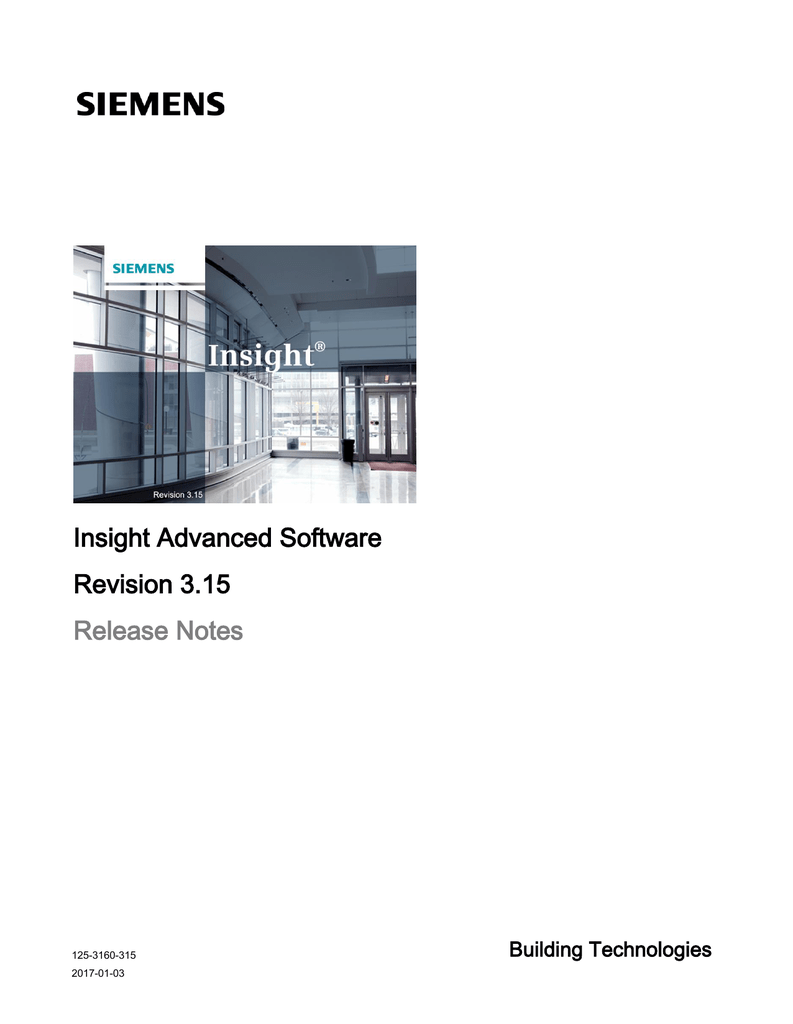- Siemens Insight 3.13 User Manual Pdf
- Siemens Insight 3.13 User Manual 2016
- Siemens Insight 3.13 User Manual Guide
DUBLIN--(BUSINESS WIRE)--The 'Laboratory Automation Market: Global Industry Trends, Share, Size, Growth, Opportunity and Forecast 2019-2024' report has been added to ResearchAndMarkets.com's offering.
Siemens Desigo Insight, Operating the management station, V5 CM110588en0204 Building Technologies Trend 8 Trend This section contains all the information required to operate the Trend Viewer. Plant data recording is referred to as Trend in Desigo Insight and takes place in the Trend Viewer application.
The global laboratory automation market reached a value of US$ 4.55 Billion in 2018. The market value is further projected to reach US$ 6.2 Billion by 2024, exhibiting a CAGR of 5.4% during 2019-2024.
This report provides a deep insight into the global laboratory automation market covering all its essential aspects. This ranges from macro overview of the market to micro details of the industry performance, recent trends, key market drivers and challenges, SWOT analysis, Porter's five forces analysis, value chain analysis, etc.
Market Drivers
Laboratory automation is playing a major role in maximizing the accuracy of laboratory results and minimizing human errors to ensure that work is completed efficiently. It also enables the laboratory to deliver the reports quickly ensuring that actionable data is available on a short notice for review.
Automation is also enabling laboratories to reduce manual work. Automation solutions can complete many testing processes that would otherwise require significant amount of manual work. Labor costs account for a significant share of the total laboratory costs. Moreover, automation systems improve the productivity of labs and reduce the increase in costs that may arise due to wastage.
The application of automation systems has also led to a significant increase in the productivity of the drug discovery process. These systems can operate for long hours with minimal monitoring and instruction. They also allow more time for researchers to focus on their core work and reduce their time on repetitive tasks.
Automated testing solutions enable the ideal ways to protect data and ensure that it is easily available for lab teams. These systems also improve productivity of lab teams as they can track everything that happens to a sample, enabling them to view its entire history.
Market Summary
- Based on the type, the market has been segmented into modular automation and whole lab automation. Modular automation currently dominates this market.
- Based on the equipment/software type, the market has been segmented into automated clinical laboratory systems and automated drug discovery laboratory systems. Currently, automated clinical laboratory systems represents the larger segment. The automated clinical laboratory systems have been further segmented into automated workstations, LIMS, sample transport systems, specimen handling systems and storage retrieval systems. Similarly, the automated drug discovery laboratory systems have been further segmented into automated plate readers, liquid handling systems, LIMS, robotics, storage retrieval systems and dissolution testing systems.
- Based on the end-users, the market has been segmented into biotechnology and pharmaceutical companies; hospitals and diagnostic laboratories; and research and academic institutes.
- Region-wise, the market has been segmented into North America, Europe, Asia Pacific, Middle East and Africa, and Latin America. Amongst these, North America is the biggest market.
- The competitive landscape of the market has also been examined with some of the key players being Danaher, PerkinElmer, Tecan Group, Thermo Fisher, Abbott Diagnostics, Agilent Technologies, Aurora Biomed, Becton Dickinson, bioMerieux, Biotek Instruments, Brooks Automation, Cerner, Eppendorf, Hamilton Storage Technologies, LabVantage Solutions, Labware, Olympus, Qiagen, Roche Holding, Siemens Healthcare, etc.
Key Topics Covered
1 Preface
2 Scope and Methodology
2.1 Objectives of the Study
2.2 Stakeholders
2.3 Data Sources
2.4 Market Estimation
2.5 Forecasting Methodology
3 Executive Summary
4 Introduction
4.1 Overview
4.2 Key Industry Trends
5 Global Laboratory Automation Market
5.1 Market Overview
5.2 Market Performance
5.3 Market Breakup by Type
5.4 Market Breakup by Equipment and Software Type
5.5 Market Breakup by End-User
5.6 Market Breakup by Region

5.7 Market Forecast
5.8 SWOT Analysis
5.8.1 Overview
5.8.2 Strengths
5.8.3 Weaknesses
5.8.4 Opportunities
5.8.5 Threats
5.9 Value Chain Analysis
5.10 Porters Five Forces Analysis
5.10.1 Overview
5.10.2 Bargaining Power of Buyers
5.10.3 Bargaining Power of Suppliers
5.10.4 Degree of Competition
5.10.5 Threat of New Entrants
5.10.6 Threat of Substitutes
6 Market Breakup by Type
6.1 Modular Automation
6.2 Whole Lab Automation
7 Market Breakup by Equipment & Software Type
7.1 Automated Clinical Laboratory Systems
7.2 Automated Drug Discovery Laboratory Systems
8 Market Breakup by End-User
8.1 Biotechnology and Pharmaceutical Companies
8.2 Hospitals and Diagnostic Laboratories
8.3 Research and Academic Institutes
9 Market Breakup by Region

9.1 North America
9.2 Europe
9.3 Asia-Pacific
9.4 Middle East and Africa
9.5 Latin America
10 Competitive Landscape
10.1 Market Structure
10.2 Key Players
10.3 Profiles of Key Players
10.3.1 Danaher
10.3.2 PerkinElmer
10.3.3 Tecan Group
10.3.4 Thermo Fisher
10.3.5 Abbott Diagnostics
10.3.6 Agilent Technologies
10.3.7 Aurora Biomed
10.3.8 Becton, Dickinson and Company
10.3.9 Biomatrix
10.3.10 Biotech Instruments
10.3.11 Brooks Automation
Siemens Insight 3.13 User Manual Pdf

10.3.12 Cerner
10.3.13 Eppendorf
10.3.14 Hamilton Storage Technologies
Siemens Insight 3.13 User Manual 2016
10.3.15 LabVantage Solutions
10.3.16 Labware
10.3.17 Olympus
Siemens Insight 3.13 User Manual Guide
10.3.18 Qiagen
10.3.19 Roche Holding
10.3.20 Siemens Healthcare
For more information about this report visit https://www.researchandmarkets.com/r/rsgcc3